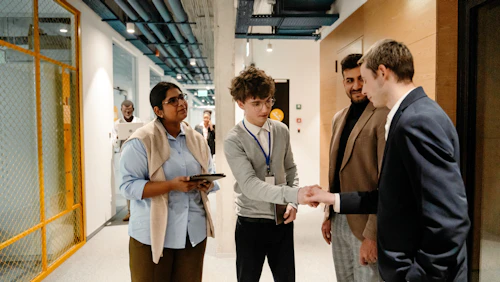Ethical AI in Recruitment: A Guide for HR Leaders
Authored by PERSOL India, India, India • 5 min read
Artificial intelligence (AI) has quickly moved from being a futuristic concept to a daily tool in recruitment. From resume parsing to video interview analysis, AI is helping talent acquisition teams speed up processes, reduce repetitive tasks, and manage large applicant volumes.
But while the efficiency is undeniable, so are the ethical questions. Can an algorithm truly make fair decisions about people’s careers? Are we unintentionally building bias into the very systems we trust to improve hiring? For recruitment leaders, the challenge isn’t whether to use AI—it’s how to use it responsibly.
Where AI is Transforming Recruitment
AI is already deeply embedded in hiring across industries in India and globally:
- Resume screening: Algorithms filter thousands of CVs within minutes.
- Chatbots: Candidates can get instant answers about job postings or application status.
- Predictive analytics: Systems forecast which candidates are most likely to succeed in a role.
- Video interview assessments: Some tools evaluate tone of voice, facial expressions, or word choice.
On the surface, these innovations seem to create fairness—machines don’t get tired, distracted, or biased like humans do. Yet beneath that efficiency lies the risk of reinforcing existing inequalities if we aren’t careful.
The Ethical Red Flags
-
Bias amplification.
If an AI system is trained on historical hiring data that already carries bias—say, a tendency to hire from certain universities or demographics—it will replicate and even magnify those patterns. -
Lack of transparency.
Many AI tools operate as “black boxes.” Candidates may never know why they were rejected, leaving them frustrated and distrustful of the employer. -
Privacy concerns.
AI systems often collect vast amounts of personal data. Without clear communication and consent, this can cross the line into intrusion. -
Overreliance on automation.
There’s a temptation to let machines make the final call, sidelining the human judgment that should remain central to recruitment.
The Evolving Regulatory Landscape
Governments are catching up with these risks.
- In India, the Digital Personal Data Protection Act (2023) emphasizes consent, data minimization, and accountability. Recruitment leaders must ensure candidate data is collected and stored responsibly.
- Globally, the EU AI Act is setting standards for transparency and risk management, while the US EEOC is scrutinizing AI-driven hiring tools for potential discrimination.
These aren’t just compliance checkboxes. They signal a global expectation: AI in hiring must be transparent, explainable, and fair.
Building Ethical AI Practices in Recruitment
So how can HR and TA leaders balance innovation with responsibility?
-
Choose transparent vendors.
Demand that AI providers explain how their systems make decisions. If they can’t, consider that a red flag. -
Audit regularly.
Conduct audits to test whether AI systems are disproportionately screening out certain groups—whether by gender, socioeconomic background, or educational pedigree. -
Keep humans in the loop.
Use AI for efficiency, but let final decisions rest with recruiters and hiring managers. AI should support human judgment, not replace it. -
Provide candidate feedback.
Even if the rejection was AI-assisted, candidates should get some explanation. This not only builds trust but also enhances employer brand. -
Be transparent in communication.
Tell candidates upfront if AI is being used in the process. Simple disclosures can build confidence that your organization is being honest and fair.
Balancing Efficiency with Empathy
Recruitment leaders must remember: hiring is not only a business transaction, it’s a deeply human experience. Candidates invest time, effort, and emotion into applications. While AI can make hiring faster and more scalable, it cannot replace empathy.
For example, a chatbot may answer questions at midnight, but a personal call from a recruiter explaining next steps is what truly builds a candidate relationship. Similarly, while an algorithm may flag skills gaps, it takes a recruiter to see potential beyond a CV.
The Employer Brand Advantage of Ethical AI
Here’s the often-overlooked benefit: using AI ethically can actually strengthen employer brand.
- Trust attracts talent. Gen Z and millennials, in particular, value transparency and fairness. They’re more likely to engage with employers who openly share how technology is used.
- Inclusive practices improve diversity. Ethical AI adoption can help companies move closer to their DEI goals rather than away from them.
- Market reputation matters. In an era of online reviews and social media, candidates quickly share negative experiences. A reputation for fairness becomes a competitive edge.
Looking Ahead: Human + AI, Not Human vs. AI
The future of recruitment is not about choosing between human recruiters and AI—it’s about partnership. Imagine a system where AI screens applications quickly, highlights patterns, and provides insights, while human recruiters bring judgment, empathy, and culture fit evaluation.
This “augmented recruitment” model can deliver the best of both worlds: efficiency with fairness, speed with transparency. But only if recruitment leaders make conscious choices about how they implement AI today.
Conclusion
AI will continue to reshape the way organizations find and hire talent. The question isn’t whether recruitment leaders will adopt it—the reality is they already have. The real question is how they will adopt it.
Those who approach AI with responsibility—demanding transparency, auditing for bias, and keeping empathy at the center—will not only stay compliant but also build stronger employer brands. More importantly, they’ll ensure that technology enhances the dignity of work rather than diminishing it.
Because at the end of the day, recruitment is still about people. And no algorithm can replace the trust, fairness, and human connection that great recruiters bring to the table.
Related Articles
Scaling the Next-Gen Global Capability Centre...
3 Strategic Talent Trends for 2026
Goodbye Email to Colleagues on Last Working D...
In India, 68% of new hires return to former employers, but your farew...
Salary Negotiation Email: The Script That Got...
78% of Indian professionals who negotiated their salary secured bette...
AI in Hiring
What Indian HR Leaders Are Getting Right and Where Caution Still Matters




